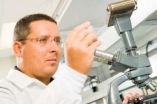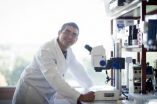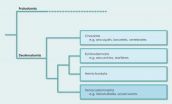(Press-News.org) Montreal, February 16, 2011 – Recent studies conducted at the Institut de recherches cliniques de Montréal (IRCM) on a group of PCSK enzymes could have a positive impact on health, from cholesterol to osteoporosis. A team led by Dr. Nabil G. Seidah, Director of the Biochemical Neuroendocrinology research unit, has published six articles in prestigious scientific journals over the past four months, all shedding light on novel functions of certain PCSK enzymes.
PCSK enzymes belong to the proprotein convertase family, responsible for the conversion of an inactive protein into its active state. The latest projects led by Dr. Seidah and his team focused on five of the nine PCSK enzymes, which are implicated in diseases such as cardiovascular and neuroendocrine disorders, cancer, and viral infections.
PCSK9 could help lower bad cholesterol levels
A member of the proprotein convertase family, PCSK9 plays a key role in the regulation of cholesterol. It is involved in causing familial hypercholesterolemia, a genetic disorder characterized by high total cholesterol levels in the blood, specifically very high levels of LDL (low-density lipoprotein) or bad cholesterol, which can lead to the early onset of cardiovascular diseases. PCSK9 is thus a target for the treatment of dyslipidemia, which results from an abnormal concentration of lipids (fat) in the blood. It is believed that inhibition of PCSK9 function could lower LDL-cholesterol levels, and such treatments are currently undergoing early phase clinical trials.
"Members of my team, led by Dr. Annik Prat and Dr. Anna Roubtsova, discovered that PCSK9 also regulates fatty acids," explains Dr. Seidah. "They investigated its role in the metabolism of body fat, and found that PCSK9 is pivotal in regulating cholesterol and fat metabolism: it maintains high circulating cholesterol levels, but it also limits fat generation."
In another study, the researchers uncovered further data on PCSK9's mechanism of action and functional structure. Their data showed that a part of PCSK9 inhibits its own function, and that acidic pH levels affect the degradation of bad cholesterol receptors.
In a third study, the team discovered that two other PCSK enzymes, Furin (PCSK3) and PC5/6 (PCSK5), reduce the level of active PCSK9. "They were able to demonstrate how enzymes of the PCSK family communicate with one another and found that liver-derived Furin cuts PCSK9 and inactivates it," adds Dr. Seidah. "This provided genetic evidence for the mechanism behind the functioning of a mutant gene found in some human hypercholesterolemic patients."
An important enzyme for osteoporosis, especially for women after menopause
The eighth member of the family (PCSK8), known as SKI-1/S1P, is critical in the intracellular pathway leading to the synthesis of cholesterol and fatty acids. Researchers discovered a new function of the enzyme in the regulation of bone formation. They demonstrated that mineralization – the process by which the body uses minerals to build bone structure – was blocked by inhibitors of SKI-1/S1P.
"The team found that SKI-1/S1P also regulates the activation of a membrane-bound transcription factor required for bone formation, which could have an impact on osteoporosis," says Dr. Seidah. "This could be especially important for women after menopause, as they are most likely to develop bone disease."
A better understanding of an enzyme implicated in various cancers
PC7 (or PCSK7) is the most ancient and highly-conserved basic amino acid-specific member of the proprotein convertase family. The team of researchers, led by Estelle Rousselet, shed light on how PC7 functions within cells, and was able to define its intracellular trafficking pathways. "We identified a mechanism for PC7's unique ability to activate the precursor of epidermal growth factor, which is involved in various cancers, tumour growth, and the maintenance of stem cells," concludes Dr. Seidah.
### END
1 group of enzymes could have a positive impact on health, from cholesterol to osteoporosis
IRCM's Dr. Nabil G. Seidah and his team publish 6 articles on PCSK enzymes
2011-02-17
ELSE PRESS RELEASES FROM THIS DATE:
Neurologists develop software application to help identify subtle epileptic lesions
2011-02-17
Researchers from the Department of Neurology at NYU Langone Medical Center identified potential benefits of a new computer application that automatically detects subtle brain lesions in MRI scans in patients with epilepsy. In a study published in the February 2011 issue of PLoS ONE, the authors discuss the software's potential to assist radiologists in better identifying and locating visually undetectable, operable lesions.
"Our method automatically identified abnormal areas in MRI scans in 92 percent of the patients sampled, which were previously identified by expert ...
Increasing brain enzyme may slow Alzheimer's disease progression
2011-02-17
LOS ANGELES – Increasing puromycin-sensitive aminopeptidase, the most abundant brain peptidase in mammals, slowed the damaging accumulation of tau proteins that are toxic to nerve cells and eventually lead to the neurofibrillary tangles, a major pathological hallmark of Alzheimer's disease and other forms of dementia, according to a study published online in the journal, Human Molecular Genetics.
Researchers found they could safely increase the puromycin-sensitive aminopeptidase, PSA/NPEPPS, by two to three times the usual amount in animal models, and it removed the ...
Hip, thigh implants can raise bone fracture risk in children
2011-02-17
Children with hip and thigh implants designed to help heal a broken bone or correct other bone conditions are at risk for subsequent fractures of the very bones that the implants were intended to treat, according to new research from Johns Hopkins Children's Center.
Findings of the Johns Hopkins study, based on an analysis of more than 7,500 pediatric bone implants performed at Hopkins over 15 years, will be presented Feb. 16 at the annual meeting of the American Academy of Orthopaedic Surgeons.
Although the absolute risk among the patients was relatively small — nine ...
Erg gene key to blood stem cell 'self-renewal'
2011-02-17
Scientists from the Walter and Eliza Hall Institute have begun to unravel how blood stem cells regenerate themselves, identifying a key gene required for the process.
The discovery that the Erg gene is vitally important to blood stem cells' unique ability to self-renew could give scientists new opportunities to use blood stem cells for tissue repair, transplantation and other therapeutic applications.
Professor Doug Hilton, Dr Samir Taoudi and colleagues from the institute's Molecular Medicine and Cancer and Haematology divisions led the study. Dr Taoudi said the research ...
Xenacoelomorpha -- a new phylum in the animal kingdom
2011-02-17
An international team of scientists including Albert Poustka from the Max Planck Institute for Molecular Genetics in Berlin has discovered that Xenoturbellida and the acoelomorph worms, both simple marine worms, are more closely related to complex organisms like humans and sea urchins than was previously assumed. As a result they have made a major revision to the phylogenetic history of animals. Up to now, the acoelomate worms were viewed as the crucial link between simple animals like sponges and jellyfish and more complex organisms. It has now emerged that these animals ...
Tau-induced memory loss in Alzheimer's mice is reversible
2011-02-17
VIDEO:
To test their capacity to learn, the mice are trained to find an underwater platform which is not visible to them from the edge of a water basin. The swimming...
Click here for more information.
Amyloid-beta and tau protein deposits in the brain are characteristic features of Alzheimer disease. The effect on the hippocampus, the area of the brain that plays a central role in learning and memory, is particularly severe. However, it appears that the toxic effect of tau ...
Insects hold atomic clues about the type of habitats in which they live
2011-02-17
Scientists have discovered that insects contain atomic clues as to the habitats in which they are most able to survive. The research has important implications for predicting the effects of climate change on the insects, which make up three-quarters of the animal kingdom.
Applying a method previously only used to examine the possible effects of climate change on plants, scientists from the University of Cambridge can now determine the climatic tolerances of individual insects. Their research was published today, 16 February, in the scientific journal Biology Letters.
Because ...
Researchers link gene mutations to Ebstein's anomaly
2011-02-17
Ebstein's anomaly is a rare congenital valvular heart disease. Now, in patients with this disease, researchers of the Academic Medical Center Amsterdam in the Netherlands, the University of Newcastle, UK and the Max Delbrück Center for Molecular Medicine (MDC) Berlin-Buch have identified mutations in a gene which plays an important role in the structure of the heart. The researchers hope that these findings will lead to faster diagnosis and novel, more specifically targeted treatment methods (Circulation Cardiovascular Genetics, DOI: 10.1161/CIRCGENETICS.110.957985)*.
Ebstein's ...
Build your online networks using social annotations
2011-02-17
Researchers at Toshiba are working on a way of finding clusters of like-minded bloggers and others online using "social annotations". Social annotations are the tags and keywords, the comments and feedback that users, both content creators and others associate with their content. Their three-step approach could help you home in on people in a particular area of expertise much more efficiently and reliably than simply following search engine results. The same tools might also be used in targeted marketing.
Users of photo gallery sites, such as Flickr (http://www.flickr.com/) ...
Water softeners not found to improve childhood eczema
2011-02-17
The first study of its kind in the world — involving 336 children aged between six months and 16 years old — has shown that installing a water softener for three months brings no additional relief for eczema sufferers.
Up to one fifth of all children of school age have eczema, along with about one in 12 of the adult population. Anecdotal reports from patients have suggested that hard water may worsen atopic eczema. Population surveys have also suggested a possible link between atopic eczema prevalence and the degree of water hardness.
It had been hoped that water softeners ...
LAST 30 PRESS RELEASES:
Weight-loss wonder pills prompt scrutiny of key ingredient
Nonprofit leader Diane Dodge to receive 2026 Penn Nursing Renfield Foundation Award for Global Women’s Health
Maternal smoking during pregnancy may be linked to higher blood pressure in children, NIH study finds
New Lund model aims to shorten the path to life-saving cell and gene therapies
Researchers create ultra-stretchable, liquid-repellent materials via laser ablation
Combining AI with OCT shows potential for detecting lipid-rich plaques in coronary arteries
SeaCast revolutionizes Mediterranean Sea forecasting with AI-powered speed and accuracy
JMIR Publications’ JMIR Bioinformatics and Biotechnology invites submissions on Bridging Data, AI, and Innovation to Transform Health
Honey bees navigate more precisely than previously thought
Air pollution may directly contribute to Alzheimer’s disease
Study finds early imaging after pediatric UTIs may do more harm than good
UC San Diego Health joins national research for maternal-fetal care
New biomarker predicts chemotherapy response in triple-negative breast cancer
Treatment algorithms featured in Brain Trauma Foundation’s update of guidelines for care of patients with penetrating traumatic brain injury
Over 40% of musicians experience tinnitus; hearing loss and hyperacusis also significantly elevated
Artificial intelligence predicts colorectal cancer risk in ulcerative colitis patients
Mayo Clinic installs first magnetic nanoparticle hyperthermia system for cancer research in the US
Calibr-Skaggs and Kainomyx launch collaboration to pioneer novel malaria treatments
JAX-NYSCF Collaborative and GSK announce collaboration to advance translational models for neurodegenerative disease research
Classifying pediatric brain tumors by liquid biopsy using artificial intelligence
Insilico Medicine initiates AI driven collaboration with leading global cancer center to identify novel targets for gastroesophageal cancers
Immunotherapy plus chemotherapy before surgery shows promise for pancreatic cancer
A “smart fluid” you can reconfigure with temperature
New research suggests myopia is driven by how we use our eyes indoors
Scientists develop first-of-its-kind antibody to block Epstein Barr virus
With the right prompts, AI chatbots analyze big data accurately
Leisure-time physical activity and cancer mortality among cancer survivors
Chronic kidney disease severity and risk of cognitive impairment
Research highlights from the first Multidisciplinary Radiopharmaceutical Therapy Symposium
New guidelines from NCCN detail fundamental differences in cancer in children compared to adults
[Press-News.org] 1 group of enzymes could have a positive impact on health, from cholesterol to osteoporosisIRCM's Dr. Nabil G. Seidah and his team publish 6 articles on PCSK enzymes


